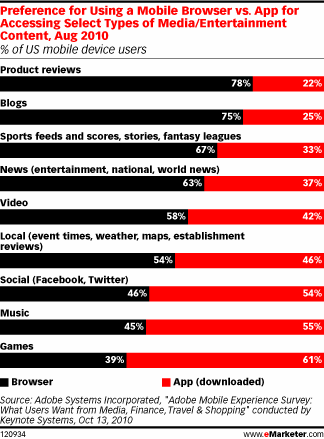It is well known that the world is in a trend toward using mobile computing devices (smartphones and tablets). The big talk around of the expected success of a company that offers these devices is strongly based on the mobile applications (apps) available for these devices. For example, Research In Motion is a company that has constantly been scrutinized for its lack apps on its Blackberry devices. Apple, and Google’s Android have been gaining market share in the mobile device market, while RIM has been losing market share. The media has explained that this is due to Apple and Google’s Android mobile devices providing a much larger number and better variety of applications than available on RIM’s Blackberries. I have also read many articles pointing out that this is perhaps Blackberry’s biggest problem, and that RIM would continue to lose market share unless it changed its ways and offered more competent apps.
An article I found on www.emarketer.com titled “Mobile Users Prefer Browsers over Apps” states that “mobile users polled by Keynote Systems for Adobe reported a preference for mobile browsers to access virtually all mobile content. Games, music and social media were the only categories in which users would rather use a downloaded app than browse the mobile web.”
 While games, music, and social media are a very big part of smartphones and tablets, the internet browser cannot be dismissed as a key requirement for any portable computing device. The figure to the left shows users prefer to use browsers over apps for video, news, sports, blog, and product review content. The question that now arises is:
While games, music, and social media are a very big part of smartphones and tablets, the internet browser cannot be dismissed as a key requirement for any portable computing device. The figure to the left shows users prefer to use browsers over apps for video, news, sports, blog, and product review content. The question that now arises is:
If a mobile device can offer the best browsing experience, will it succeed?
The article “Mobile Users Prefer Browsers over Apps” further states that “[such mobile user] preferences may surprise mobile experts who consider apps to offer the best content and shopping experiences. And marketers may be frustrated as well; getting an app on a user’s home screen is a constant reminder of the brand, but it doesn’t make sense to offer an app users don’t want.”
I have experienced comparative browser qualities and capabilities on both of Apple and Android mobile devices, while RIM’s Blackberries have not been able to measure up to the competition. This may be another large factor of why RIM is losing market share against Apple and Android. I believe, however, that as computing becomes increasingly mobile, and with the trend toward cloud computing, perhaps current downloaded mobile apps are not quite as important as they are said to be, and that browser capabilities and usability might be the answer to RIM’s problems.
Currently, apps require storage space on devices, and yet it is known, that Microsoft and IBM have bet on cloud computing where information is stored in large dynamic data bases that browsers connect to rather than programs stored on individual computers.
If cloud computing is the way of the future, and it requires a browser, and users prefer browsers over apps, then does it not beg the consequence that mastering a user’s browser experience even perhaps through “webapps” would be the way of future success rather than apps that are downloaded?